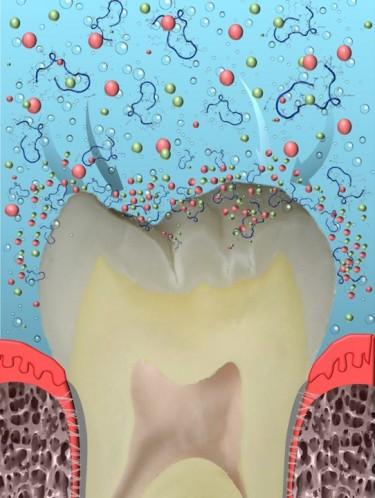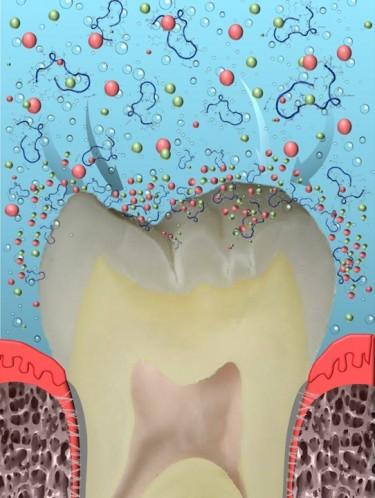
Credit: University of Washington
Researchers at the University of Washington have designed a convenient and natural product that uses proteins to rebuild tooth enamel and treat dental cavities.
The research finding was first published in ACS Biomaterials Science and Engineering.
"Remineralization guided by peptides is a healthy alternative to current dental health care," said lead author Mehmet Sarikaya, professor of materials science and engineering and adjunct professor in the Department of Chemical Engineering and Department of Oral Health Sciences.
The new biogenic dental products can — in theory — rebuild teeth and cure cavities without today's costly and uncomfortable treatments.
"Peptide-enabled formulations will be simple and would be implemented in over-the-counter or clinical products," Sarikaya said.
Cavities are more than just a nuisance. According to the World Health Organization, dental cavities affect nearly every age group and they are accompanied by serious health concerns. Additionally, direct and indirect costs of treating dental cavities and related diseases have been a huge economic burden for individuals and health care systems.
"Bacteria metabolize sugar and other fermentable carbohydrates in oral environments and acid, as a by-product, will demineralize the dental enamel," said co-author Sami Dogan, associate professor in the Department of Restorative Dentistry at the UW School of Dentistry.
Although tooth decay is relatively harmless in its earliest stages, once the cavity progresses through the tooth's enamel, serious health concerns arise. If left untreated, tooth decay can lead to tooth loss. This can present adverse consequences on the remaining teeth and supporting tissues and on the patient's general health, including life-threating conditions.
Good oral hygiene is the best prevention, and over the past half-century, brushing and flossing have reduced significantly the impact of cavities for many Americans. Still, some socio-economic groups suffer disproportionately from this disease, the researchers said. And, according to recent reports from the Centers for Disease Control and Prevention, the prevalence of dental cavities in Americans is again on the rise, suggesting a regression in the progress of combating this disease.
Taking inspiration from the body's own natural tooth-forming proteins, the UW team has come up with a way to repair the tooth enamel. The researchers accomplished this by capturing the essence of amelogenin — a protein crucial to forming the hard crown enamel — to design amelogenin-derived peptides that biomineralize and are the key active ingredient in the new technology. The bioinspired repair process restores the mineral structure found in native tooth enamel.
"These peptides are proven to bind onto tooth surfaces and recruit calcium and phosphate ions," said Deniz Yucesoy, a co-author and a doctoral student at the UW.
The peptide-enabled technology allows the deposition of 10 to 50 micrometers of new enamel on the teeth after each use. Once fully developed, the technology can be used in both private and public health settings, in biomimetic toothpaste, gels, solutions and composites as a safe alternative to existing dental procedures and treatments. The technology enables people to rebuild and strengthen tooth enamel on a daily basis as part of a preventive dental care routine. It is expected to be safe for use by adults and children.
###
Co-authors are H. Fong, research scientist in the UW Department of Materials Science and Engineering, and Greg Huang, professor and chair of Orthodontics in the School of Dentistry.
The research was funded by the Washington State Life Sciences Discovery Fund and the UW Department of Restorative Dentistry's Spencer Fund.
For further information, contact [email protected] or http://www.uwgemsec.com.
Media Contact
Jackson Holtz
[email protected]
206-543-2580
@UW
http://www.washington.edu/news/
Original Source
http://www.washington.edu/news/2018/04/12/peptide-based-biogenic-dental-product-may-cure-cavities/ http://dx.doi.org/10.1021/acsbiomaterials.7b00959





